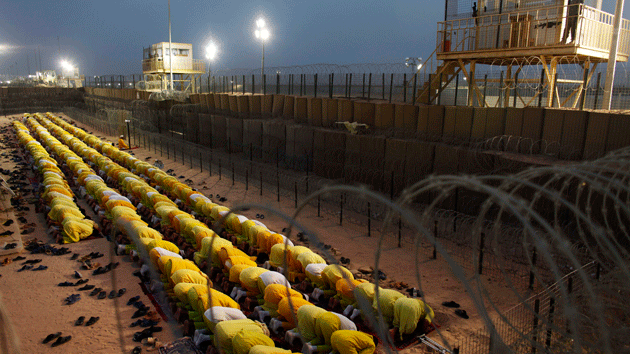
Canadian Andre Poulin, since deceased, converted to Islam and starred in a recruitment video for the Islamic State. Al Hayat Media Center, Screenshot: <a href="<http://www.nytimes.com/2014/07/16/world/middleeast/isis-uses-andre-poulin-a-canadian-convert-to-islam-in-recruitment-video.html">New York Times</a>
In May, Moner Mohammed Abusalha, a 22-year-old American who had joined Jabhat al-Nusra, an Al Qaeda-allied group in Syria, drove a bomb-laden truck into a restaurant in the northern province of Idlib, killing dozens.* Before carrying out this suicide bombing, the New York Times reported last week, Abusalha had briefly returned home to his native Florida. Abusalha’s story underscores a mounting concern among Western national security officials, because while he detonated his truck bomb in Syria, he could have easily struck within the United States.
Abu Bakr al-Baghdadi’s Islamic State, the Sunni extremist group that has seized control of a swath of territory in Syria and northern Iraq, has enlisted thousands of fundamentalist volunteers from Germany, France, the Netherlands, Australia, the United States, and elsewhere. Counterterrorism officials fear that jihadists like Abusalha, holding European Union or US passports, can all too easily return to their home countries and possibly import terrorism. US officials, says former New Jersey Gov. Tom Kean, who co-chaired the 9/11 Commission, are “scared, really scared.” FBI Director James Comey recently told reporters that the threat of Westerners with European Union and US passports joining the Islamic State “keeps me up at night” and that he believes another wave of September 11-style attacks are a possibility. And Attorney General Eric Holder told ABC News, “In some ways, it’s more frightening than anything I’ve seen as attorney general.”
Recruits have flocked to Baghdadi’s cause from places such as Austria, where in April, two girls, 15 and 16 years old, left their homes in Vienna and flew to Adana, Turkey, leaving notes saying they had “chosen the right path”—that is, they were likely trying to join up with the Islamic State. A month earlier, a young Austrian man, now a foot soldier in Baghdadi’s crusade, posted footage online of Islamic State fighters obliterating a Shiite mosque in the Syrian city of Raqqa, according to Der Standard. All told, about 100 young Austrians have left the country to answer Baghdadi’s call for jihadist recruits.
For the past few months, the Islamic State, formerly known as ISIS, has been taking over parts of Syria and Iraq and it has declared a new state based on Islamic extremism. In a speech at a mosque in Mosul in early July, Baghdadi, with translations appearing on jihadi websites in several languages, directly called on young would-be jihadists in other nations to join him in Iraq. Since then, teenagers and twentysomethings, responding to social-media campaigns and radical preachers, have been heading to the region to fight for the Islamic State and related extremist groups.
“Some [jihadists] might not want to do this once they get back,” says Michael O’Hanlon, the director of foreign policy research at the Brookings Institution. “But 10, 20, 30, or 40 percent…will [have] a reinforced sense of jihad.” O’Hanlon says returning young extremists who retain their fervor—however small a group they might be—”definitely” pose a threat. And a senior Obama administration official agrees: “We’re moving fast to respond to what could be a group of jihadists with US and EU passports, who can easily come back to their home countries.”
But national security experts say there may be little governments can do to keep radicalized Westerners from returning. Government officials worldwide are discussing how best to deal with the situation. The Austrian government is proposing an amendment to its Citizenship Act that would to revoke the citizenship of Austrians who “voluntarily and actively take part in hostilities abroad…unless this would render him stateless.” Ralph Janik, a research assistant at the University of Vienna, points out that the final clause of the amendment makes the measure “rather toothless,” unless a departed jihadist has obtained a new passport from another country. Even if the Austrian government were able to police and stop the return of all its jihadists, it would first have to identify them—not an easy task. As Der Standard notes, “Very few make their plans to go to jihad publicly.”
French Interior Minister Bernard Cazenueve presented around 20 different measures to the French cabinet in late April concerning the threat posed by returning jihadists. According to Al Jazeera, Cazenueve has threatened to strip French citizens of their nationality if caught leaving for jihad, and he has said that the main goals of his measures are “to stop departures and dismantle Jihadist networks.” He announced this plan after media reports revealed transcripts of online conversations between a potential French jihadist and a senior member of Al Qaeda in the Islamic Maghreb, in which they identified the Eiffel Tower and the Louvre as potential targets for terrorist strikes.
In early July, interior ministers from nine countries—Belgium, Denmark, England, France, Germany, Italy, the Netherlands, Spain, and Sweden—adopted an “action plan,” according to the European Union’s counterterrorism coordinator Gilles de Kerchove, to identify citizens traveling to Syria in order to try to prevent them from joining terrorist groups there.
Australian citizens, according to several reports, represent a large percentage of the jihadists joining Baghdadi’s ranks from the Western world. And the Australian government is considering restrictive measures including revoking passports of suspected terrorists. Throughout the summer of 2013, more than 200 Australians were reported to have joined the Syrian rebel forces fighting against President Bashar al-Assad. Australian Foreign Affairs Minister Julie Bishop told the Australian Broadcasting Service that the flow of Australians signing on with the Islamic State “is one of the most disturbing developments in our domestic security in quite some time.”
Despite the efforts of various countries to restrict travel, share security information, and revoke citizenship, it will be tough for them to detect the quiet and indirect journeys of would-be jihadists. The open Turkish border allows foreigners to make their way to Iraq and Syria—and back—without detection.

Terrorism experts fear that Baghdadi’s campaign might be more attractive to young potential jihadists in the West than Al Qaeda’s cause. “Baghdadi is about apocalyptic visions of revolution, death, martyrdom and redemption through violence…There is a part of the human psyche, at least with many people (not just suicidals), that prefers [this] vision,” O’Hanlon observes.
It’s not hard to explain why young, alienated adults are drawn to the Islamic State, says Brian Forst, an American University professor who specializes in criminology and counterterrorism: “Fighting for a cause has always been popular among the young, especially alienated 17-year-old males unaware or other options for making a difference. This has been true both for sovereign nations and for nonstate organizations in need of enlistees. They use emotional hooks of adventure, intrigue, and a lofty cause to appeal to young people in far away places.”
Jordan Tama, an assistant professor at American University who focuses on national security, notes that Baghdadi is “attracting more people from Western countries than bin Laden was able to attract.” The Islamic State’s success on the battlefield and its online media and propaganda contribute to its allure among wannabe jihadists. “Baghdadi has done an amazing amount—he has captured cities, he has mobilized huge amounts of people, he is killing ruthlessly throughout Iraq and Syria,” a former British counterterrorism chief told the Washington Post, while Al Qaeda factions have not demonstrated such successes lately.
O’Hanlon believes that the only solution to the problem is to try to confront it directly in Iraq and Syria, though he’s unsure of how exactly that will or can be done. “I don’t know if there’s much you can do about it,” O’Hanlon says about the young Westerners enlisting with Baghdadi, adding, “If people are quiet about it and we have no proof, it’s hard to revoke citizenship…you can’t do that to US citizens. We’ve got a dilemma on our hands.”
Correction: The original version of this story said that Moner Muhammed Abusalha joined the Islamic State. He was a part of Jabhat al-Nusra.
















